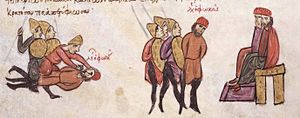Political mutilation in Byzantine culture
Political Mutilation in Byzantine Culture
Political mutilation in Byzantine culture refers to the practice of physically disfiguring or harming individuals for political reasons within the Byzantine Empire. This form of punishment was used as a means of asserting power, instilling fear, and deterring dissent among the populace.
History[edit | edit source]
The practice of political mutilation in Byzantine culture dates back to the early centuries of the Byzantine Empire. It was often employed by rulers and officials to punish political opponents, rebels, or individuals deemed as threats to the established order.
One of the most infamous cases of political mutilation in Byzantine history occurred during the reign of Emperor Justinian II in the 7th century. After being deposed and exiled, Justinian II returned to power and sought revenge on those who had opposed him. He ordered the mutilation of his political enemies, including the removal of their noses, blinding, or amputation of limbs.
Methods of Mutilation[edit | edit source]
Political mutilation in Byzantine culture took various forms, including:
1. Nose-cutting: The removal of the nose was a common form of punishment, intended to permanently disfigure the individual and mark them as a social outcast.
2. Blinding: Blinding was another brutal method of political mutilation used to incapacitate and humiliate the victim, rendering them unable to hold positions of power or challenge the ruling authority.
3. Amputation: In some cases, political opponents were subjected to amputation of limbs, such as hands or feet, as a severe form of punishment and deterrence.
Impact and Legacy[edit | edit source]
The practice of political mutilation in Byzantine culture had a lasting impact on society, instilling fear and obedience among the population. The physical scars and disabilities inflicted on individuals served as a visible reminder of the consequences of challenging the authority of the ruling elite.
Despite its brutal nature, political mutilation was seen as a legitimate means of maintaining order and stability within the Byzantine Empire. However, over time, as societal norms evolved, the practice gradually fell out of favor and was eventually abolished.
See also[edit | edit source]
Search WikiMD
Ad.Tired of being Overweight? Try W8MD's physician weight loss program.
Semaglutide (Ozempic / Wegovy and Tirzepatide (Mounjaro / Zepbound) available.
Advertise on WikiMD
|
WikiMD's Wellness Encyclopedia |
| Let Food Be Thy Medicine Medicine Thy Food - Hippocrates |
Translate this page: - East Asian
中文,
日本,
한국어,
South Asian
हिन्दी,
தமிழ்,
తెలుగు,
Urdu,
ಕನ್ನಡ,
Southeast Asian
Indonesian,
Vietnamese,
Thai,
မြန်မာဘာသာ,
বাংলা
European
español,
Deutsch,
français,
Greek,
português do Brasil,
polski,
română,
русский,
Nederlands,
norsk,
svenska,
suomi,
Italian
Middle Eastern & African
عربى,
Turkish,
Persian,
Hebrew,
Afrikaans,
isiZulu,
Kiswahili,
Other
Bulgarian,
Hungarian,
Czech,
Swedish,
മലയാളം,
मराठी,
ਪੰਜਾਬੀ,
ગુજરાતી,
Portuguese,
Ukrainian
Medical Disclaimer: WikiMD is not a substitute for professional medical advice. The information on WikiMD is provided as an information resource only, may be incorrect, outdated or misleading, and is not to be used or relied on for any diagnostic or treatment purposes. Please consult your health care provider before making any healthcare decisions or for guidance about a specific medical condition. WikiMD expressly disclaims responsibility, and shall have no liability, for any damages, loss, injury, or liability whatsoever suffered as a result of your reliance on the information contained in this site. By visiting this site you agree to the foregoing terms and conditions, which may from time to time be changed or supplemented by WikiMD. If you do not agree to the foregoing terms and conditions, you should not enter or use this site. See full disclaimer.
Credits:Most images are courtesy of Wikimedia commons, and templates Wikipedia, licensed under CC BY SA or similar.
Contributors: Prab R. Tumpati, MD

